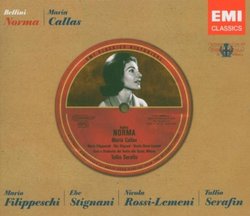| All Artists: Vincenzo Bellini, Tullio Serafin, La Scala Theater Orchestra, Ebe Stignani, Maria Callas, Mario Filippeschi, Nicola Rossi-Lemeni, Paolo Caroli, Rina Cavallari Title: Bellini: Norma (complete opera) with Maria Callas, Tullio Serafin, Chorus & Orchestra of La Scala, Milan Members Wishing: 0 Total Copies: 0 Label: EMI Classics Release Date: 6/7/2005 Album Type: Original recording remastered Genre: Classical Styles: Opera & Classical Vocal, Historical Periods, Modern, 20th, & 21st Century, Symphonies Number of Discs: 3 SwapaCD Credits: 3 UPC: 724358683424 |
Search - Vincenzo Bellini, Tullio Serafin, La Scala Theater Orchestra :: Bellini: Norma (complete opera) with Maria Callas, Tullio Serafin, Chorus & Orchestra of La Scala, Milan
 | Vincenzo Bellini, Tullio Serafin, La Scala Theater Orchestra Bellini: Norma (complete opera) with Maria Callas, Tullio Serafin, Chorus & Orchestra of La Scala, Milan Genre: Classical
|
Larger Image |
CD Details |
CD ReviewsGreatest Norma at greatest price! Richard Murray | Fraser, MI USA | 07/04/2005 (5 out of 5 stars) "EMI has again favored us Callas fans with one of her greatest recordings at budget price. When first released in the CD format, this 3-disc 1954 landmark NORMA was sold at full price. In a second phase release EMI placed it in it's Recordings of the Century series, bringing the price down, but still retaining the notes and libretto. Now the third phase release is an irresistable price drop, now minus the libretto. If you love opera in general, or you love Bellini, or you love to hear the 30-year-old, newly dieted Callas at her utmost peak, you must have this NORMA. Like other reviewers, I, too, wondered why EMI didn't put more of a dream cast together with La Divina , such as Corelli or del Monaco as Pollione, and Barbieri or Simionato as Adalgisa. Yet, Callas' assembled collegues meet the demands of their roles more than adequately. The Adalgisa of Stignani shows her amazing capabilities, even at the end of a three-decade career. Her voice may have that mature, matronly sound, but her insight into her role matches Callas at every turn. Tenor Mario Filippeschi is a very satisfying choice for the role of Pollione. He was already a seasoned veteran of the opera stage, and had collaborated with Callas on other productions such as a 1950 NORMA in Mexico as well as Rossini's ARMIDA the following year in Florence. It is refreshing to hear this tenor able and unafraid to deliver the role with such panache, clarion high notes and all. The bass role of Oroveso is ably covered by Nicola Rossi-Lemini, another frequest partner with Callas as well as other recording artists of her era. His distinguished career includes the lead bass in such operas as ANNA BOLENA, I PURITANI, IL TURCO IN ITALIA, IL BARBIERE DI SIVIGLIA, LA FORZA DEL DESTINO, DON CARLO, and THE SICILIAN VESPERS. I would be repeating so many other reviewers if I were to go into describing how great Maria Callas is in the role of NORMA. Some people avoid Callas altogether, saying that her voice is not pleasing to their ear. You can pull up other reviewers comments about NORMA to read, and there is plenty to read." Not the best Callas "Norma" Ralph Moore | Bishop's Stortford, UK | 02/16/2008 (3 out of 5 stars) "I am a great admirer of Callas - what sane lover of voice and opera isn't? - which is precisely why I cannot understand giving this "Norma" five stars when there is competition of far greater quality - provided by Callas herself in her other recordings. No other artist, including Sutherland or Caballe, can touch her interpretation but if you want to hear her worthily partnered, go to either of the live 1955 mono recordings with Del Monaco as Pollione (conducted by Serafin or Votto, in listenable, but limited, sound) or the 1960 stereo version with Corelli, Ludwig and - for the third time - Zaccaria. Callas' voice had not so much deteriorated by that time, apart from a few flapping top notes, and there are huge compensations in the delicacy of her characterisation, the quality of her partners and the good studio sound. (The decline in Callas' voice was not a linear process as her later recordings of "Gioconda" and the 1960 "Norma" testify.) Regarding this 1954 performance, in truth, that great artist Ebe Stignani was too mature for Adalgisa by this stage of her career, Filippeschi is very ordinary and blaring as Pollione and Rossi-Lemeni is his usual gruff, gritty self, unsteady of line compared with the smooth production of Zaccaria. No; go for any of the other three recordings I suggest before this one - though I readily admit that if none other were available, I'd probably be happy with it!"
|

 Track Listings (17) - Disc #1
Track Listings (17) - Disc #1